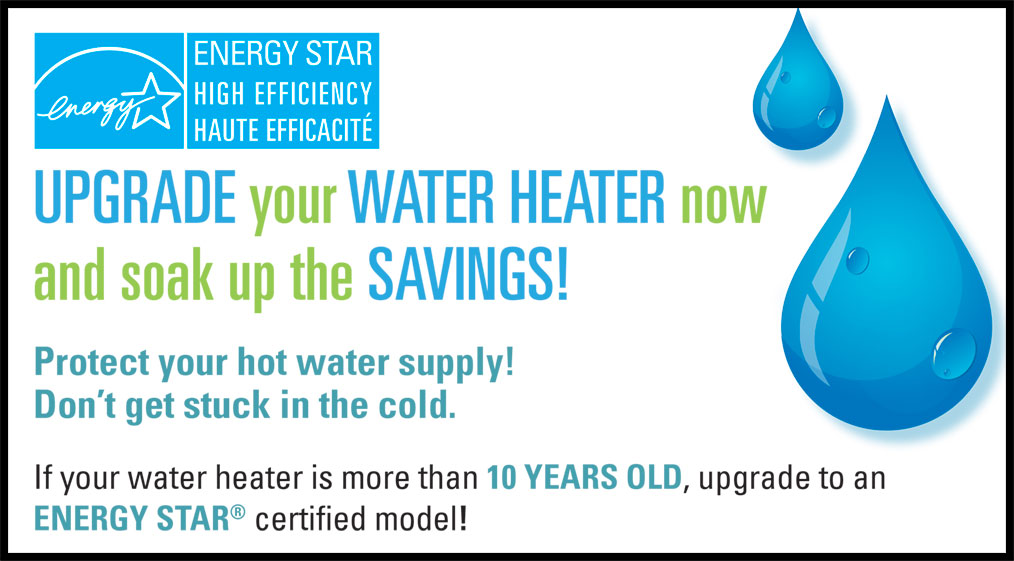Water heaters
Buy an ENERGY STAR® certified water heater to save you money!
Canadians use an average of 75 litres of hot water each at home every day—for washing dishes and clothing, cleaning and showering or bathing. Water heaters account for 17.2% of the energy used in the average Canadian home, and 5.7% of the energy used in the average commercial or institutional setting.

Source: Distribution of residential energy use in Canada 2019, Natural Resources Canada.
Text version
Residential energy use in Canada by activity
A pie chart representing energy consumed in the average Canadian home is divided into five sections: Space heating 63.6%; Water heating 17.2%; Appliances 14.1%; Lighting 3.5%; and Space cooling 1.6%.
It’s important to remember the cost of energy to operate a product over its lifetime is just as important as its purchase price. For water heaters, the operating costs are calculated by factoring in the size and type of unit, the energy source, and the equipment’s energy efficiency.
Make the switch to an ENERGY STAR certified water heater to cut your electricity bill and reduce your carbon footprint.
ENERGY STAR certified water heaters
The following ENERGY STAR certified products are available in Canada.
- Heat pump water heaters
- Solar water heaters
- Gas storage tank water heaters
- Tankless water heaters
- Commercial gas water heaters—storage or tankless (“instantaneous”)
Find certified products using the ENERGY STAR Product Finder. (Note: you will be redirected to the US ENERGY STAR website. Click “Canada” as your market). With so many technologies to choose from, you are bound to find an efficient model to fit your needs.
Water heaters that are regulated
Canada’s Energy Efficiency Regulations establish minimum performance standards for energy efficiency and help eliminate the least efficient products from the Canadian marketplace.
The following ENERGY STAR certified water heaters are subject to Canada’s Energy Efficiency Regulations: gas storage tank water heaters, tankless water heaters, commercial gas water heaters that are storage or tankless (“instantaneous”).
Electric or oil-fired storage tank water heaters are regulated but are NOT eligible for ENERGY STAR certification.
See more information about The Regulations that help eliminate the least efficient products from the Canadian market.
Related products
- See information on drain water heat recovery
Helpful tips
- Evaluate the water heater’s energy performance before buying. Gas- and oil-fired water heaters (tanked and tankless) use “energy factor” or EF. The higher the EF, the higher the efficiency.
- Buy the right size. Consult with an experienced plumber to estimate the hot water demands in your home, and be sure to hire a licensed professional to install a new one.
- Think about how you and your family uses hot water and take steps to reduce your consumption.
- Visit the individual product pages above for more helpful tips.
- See information on a combined space and water heater.
- See our list of ENERGY STAR participating manufacturers and retailers.
Tools to find energy efficient water heaters
- The easiest way to identify an efficient water heater is to look for the ENERGY STAR symbol. All ENERGY STAR certified products are tested to strict efficiency standards and are certified by an independent third party. They perform the same as or better than standard products without compromising performance in any way.
 Use the voluntary EnerGuide label on some water heaters to compare a model’s energy consumption to similar models. Learn more about EnerGuide labels.
Use the voluntary EnerGuide label on some water heaters to compare a model’s energy consumption to similar models. Learn more about EnerGuide labels.
Energy sources
Consumers often choose to use the same energy source for water heaters that we use for space heating. This is a preference, not a requirement. It pays to compare water heaters by the fuel types available in your area.
Electric
Models come in a wide array of sizes; need no venting; and are easy to install. They cannot supply hot water during a power failure and take quite a bit of time to reheat.
Natural gas
Models come in a variety of sizes, types and efficiencies; can be vented through a chimney or wall; and can provide hot water during power failures if they have continuous pilot lights. They require adequate airflow for combustion.
Propane
Models have the same pros and cons as natural gas units but propane is a more expensive fuel. Units require a dedicated storage tank and scheduled fuel delivery.
Oil
Models come in limited types and sizes; can be vented through a wall and sealed. They require adequate airflow for combustion, a dedicated storage tank and scheduled fuel delivery; and cannot supply hot water during power outages.
See a handy, detailed comparison chart in Chapter 2 of our Water Heater Guide [PDF - 2.8 MB].
The ENERGY STAR name and symbol are trademarks registered in Canada by the United States Environmental Protection Agency and are administered and promoted by Natural Resources Canada.
Page details
- Date modified:
